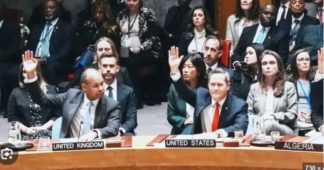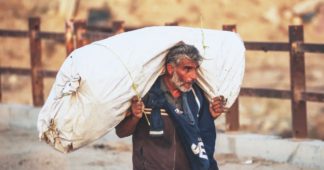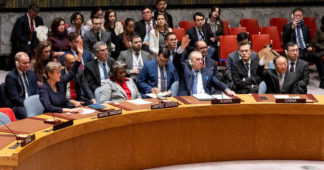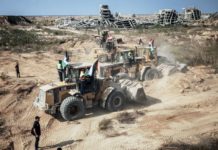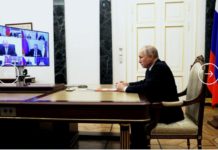by Marwan Emil Toubassi (*)
Nov 20, 2025
The adoption of UN Security Council Resolution 2803 was not surprising as much as it was shocking in its substance and implications. The resolution, which passed with 13 votes in favor and abstentions by Russia and China, appears to entrench a new reality in Gaza—one that legitimizes external control and reproduces occupation through different instruments. It does so under humanitarian slogans that mask a political engineering project designed to undermine the Palestinian right to self-determination and circumvent the establishment of an independent Palestinian state on the pre-June 4, 1967 borders—borders Washington and Tel Aviv reject in principle.
The sharp warning issued by Francesca Albanese, the UN Special Rapporteur on Human Rights in the Occupied Palestinian Territory, despite her cautious welcome of renewed Security Council attention to Gaza and the urgent need for a ceasefire, lays bare a moment of unprecedented clarity. It reveals the extent to which the international system is abandoning the very international law it was founded to uphold, replacing it with the logic of power, geopolitical investment, and political alliances.
Albanese did not merely criticize the resolution; she warned that it represents a grave deviation from the Security Council’s obligations under Article 24 of the UN Charter, which requires it to act according to the purposes and principles of the United Nations—foremost among them the right of peoples to self-determination, the implementation of international humanitarian law, and the protection of human rights.
Resolution 2803 embodies what Albanese called the “capital-security model of external control.” It speaks of “securing borders,” “protecting civilians,” and “removing weapons,” while ignoring the root causes of the conflict: the ongoing occupation, settlement expansion, blockade, apartheid regime, and ethnic cleansing. It reproduces the decades-long Western approach of managing the crisis rather than resolving it—submitting Gaza to intensified external supervision without ending the occupation, allowing reconstruction, or addressing the escalating colonial entrenchment across the West Bank and Jerusalem. Meanwhile, Israeli settler-militias, backed by a far-right government, continue to impose new facts on the ground, alongside ongoing massacres in Gaza and Ain al-Hilweh in recent days.
More alarming is that the resolution grants the United States—the most partisan supporter of Israel and effectively its partner—an elevated leadership role through the so-called “Peace Board,” a new mechanism designed to shape Gaza’s future. Here lies the core contradiction: the same power that has armed, funded, and politically shielded Israel throughout the war—and since its colonial establishment at the expense of Palestinian rights—is now appointed as the custodian of Gaza’s reconstruction and security. Albanese accurately described the resolution as the “appointment of a new director for the open-air prison that Israel built in Gaza.”
The resolution also disregards a fundamental legal reality: Israel’s military and settlement presence in any part of occupied Palestinian territory is illegal under the International Court of Justice. This obligates all states, especially the United States, to refrain from providing any form of support that sustains the occupation. Yet Resolution 2803 does the opposite—it grants the occupation a new diplomatic shield and shifts the international debate from ending the occupation to managing Gaza after the war.
If the international community were genuinely concerned with protecting civilians, it would have established an international force to supervise Israel’s immediate and unconditional withdrawal, prevent displacement, ensure accountability, and support Palestinian self-determination. Instead, the current “international administration” approach treats Palestinians not as a people with political and legal rights, but as a population under guardianship to be reorganized according to external colonial criteria.
Albanese also warned that the resolution has become a “political pressure valve” used by states fleeing their legal obligations to delay action against Israel—including sanctions and international arrest warrants for Netanyahu and other officials, as well as obligations generated by the unprecedented global solidarity movement and shifting public opinion, particularly within the United States. It also functions to circumvent the outcomes of the New York conference on the Saudi-French initiative.
This is a new form of moral evasion: substituting a cosmetic political plan for serious measures to confront grave violations of international law—from genocide to forced displacement and indiscriminate bombing.
We stand at a decisive moment for the future of Palestine. Resolution 2803 is not a passing decision; it lays the foundations for a long-term international guardianship regime that could extend for years. Such a regime would subject Gaza—and eventually the West Bank—to security arrangements crafted by the United States and Israel, transforming the Palestinian cause from a national liberation struggle into an administrative file governed by international bargaining. Peace cannot be built by entrenching occupation. Gaza cannot be protected by erasing the Palestinian people from decisions about their own destiny.
Resolution 2803 is a test for Palestinian leadership, the region, and the international community. What is required today is:
— Rejecting any form of international guardianship that disregards ending the occupation, Israeli withdrawal, and the implementation of UN resolutions.
— Insisting on the ICJ Advisory Opinion (2024) calling for the end of the occupation and previous rulings on the apartheid wall.
— Exposing and resisting the colonial logic behind post-war management.
— Building a broad diplomatic and grassroots international solidarity front to protect Palestinian self-determination and inalienable rights from political manipulation.
— And above all, the urgent need for a national Palestinian will: reviving the PLO, convening a broad national meeting to define a unified program for the coming phase, and reinvigorating the national movement—particularly Fatah—while restoring democratic life through the necessary elections. Only a renewed, legitimate Palestinian political system can safeguard the principle that the people are the source of authority, as affirmed in the Declaration of Independence.
As Francesca Albanese stated:
“This is an existential moment. The future of Gaza—and the future of the Palestinian people—must not be decided without their will and consent.”
This must form the basis of any Palestinian, Arab, or international position seeking a genuine peace built on freedom, justice, and national independence—not on recycling the occupation in new forms and faces.
(*) Former Ambassador of Palestine to Greece
.
We remind our readers that publication of articles on our site does not mean that we agree with what is written. Our policy is to publish anything which we consider of interest, so as to assist our readers in forming their opinions. Sometimes we even publish articles with which we totally disagree, since we believe it is important for our readers to be informed on as wide a spectrum of views as possible.

